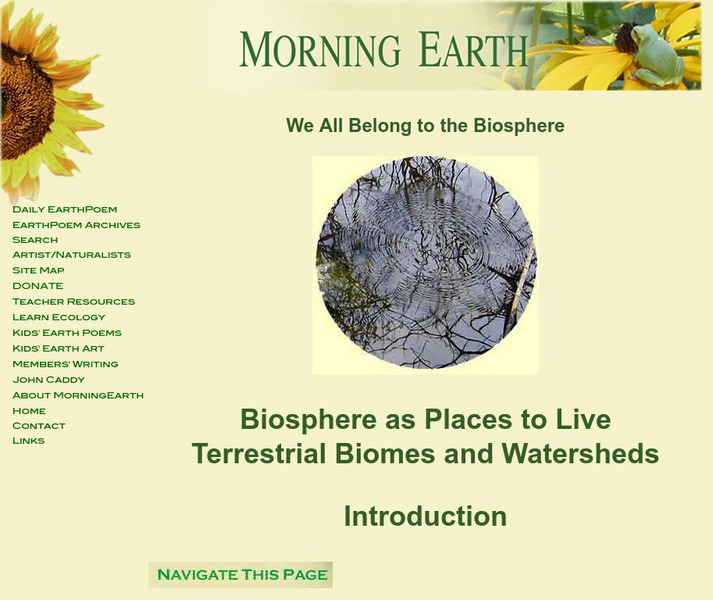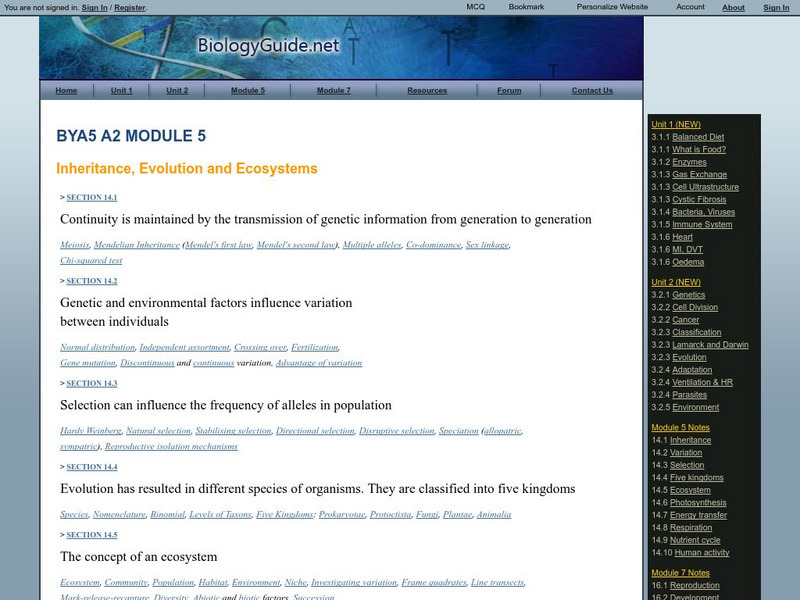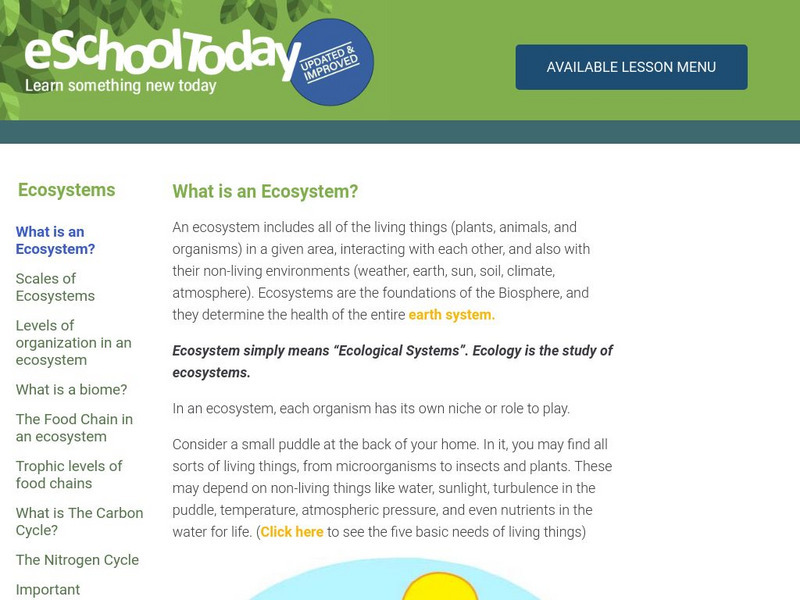Hi, what do you want to do?
Massachusetts Institute of Technology
Mit: Open Course Ware: Ecology: Communities and Ecosystems
This is a collection of courses on communities and ecosystems. Some topics explored are productivity, food webs, and ecology. The courses offer video clips, lecture notes, practice problems, and exam questions. Practice problems and exam...
Ducksters
Ducksters: Science for Kids: World Biomes and Ecosystems
Kids learn about the world's biomes and ecosystems. The network of life and biodiversity needed for all to survive.
National Earth Science Teachers Association
Windows to the Universe: Biomes and Ecosystems
Are you looking for a good starting place on where to research biomes? This site would be a great place to start as it contains lots of information about all the different biomes on Earth.
The Wild Classroom
The Wild Classroom: Biomes
This excellent resource explores all of the biomes found on planet Earth! A side menu indicates the world's biomes and provides details on each. Colorful interactive maps, video clips, lesson plans, species profiles, and so much more...
Science Buddies
Science Buddies: Home Sweet Biome: How Do Plants Grow in Different Environments?
In this science fair project you will learn about biomes and how different climatic conditions affect plant growth. This can explain why some plants and animals are similar in different areas of the country, and in other parts they are not.
Morning Earth
We All Belong: Biosphere as Place: Biomes and Watersheds
Students examine the Biology topic of the biosphere. The tutorial includes definitions, examples, and pictures on biomes and watersheds.
Other
Inheritance, Evolution, and Ecosystems
Students learn about inheritance, evolution, and ecosystems. Some topics explored in the tutorial are five kingdoms, respiration, energy transfer, and nutrient cycle.
CK-12 Foundation
Ck 12: Episd: Terrestrial Biomes
[Free Registration/Login may be required to access all resource tools.] Recognize and explore the variety of terrestrial biomes and understand the differences among them.
University of Illinois
University of Illinois Extension: Natural Resources, Environment, and Ecosystems
A collection of lesson plans for specific age levels to help students gain a better understanding of animals, plants, and people, and how they affect each other in ecosystems. Many of the activities provide discussion questions and...
Open Curriculum
Open Curriculum: Biomes
This video illustrates the relationship between biomes and climate. [3 min, 38 sec]
Georgia Department of Education
Ga Virtual Learning: Ap Environmental Science: Terrestrial Biomes and Land Use
How we can live sustainably on our natural resources while also preserving enough nature so these resources can be replenished represents one of the most important questions in environmental science. Through learning about terrestrial...
TeachEngineering
Teach Engineering: Environments and Ecosystems
Young scholars explore the biosphere and its associated environments and ecosystems in the context of creating a model ecosystem, learning along the way about the animals and resources. Students investigate different types of ecosystems,...
Texas Instruments
Texas Instruments: Glencoe Middle School Science: Biodiversity and Ecosystems
Students will conduct a field investigation to learn about the environment. They will observe biotic and abiotic factors of an ecosystem. Students can use the CBL 2 and a temperature probe to collect data and a graphing calculator to...
eSchool Today
E School Today: What Is an Ecosystem?
Learn about all the different levels of ecosystems, from the living things under a rock, up to a rainforest biome. Explains the levels of organization within an ecosystem, the different types of biomes, food chains and trophic levels,...
Enchanted Learning
Enchanted Learning: Biomes
Discover the hidden treasures in the different habitats on the earth! The earth is filled with many biomes. Examples of different biomes are listed and include hyperlinks to additional information such as the animals found there.
PBS
Pbs Learning Media: Biome in a Baggie
This ZOOMSci video segment shows how to create self-contained environments and explore how plants grow under different conditions. [3:24]
Utah Education Network
Uen: Themepark: Systems: Ecosystem
Find a large collection of internet resources organized around ecosystems. Links to places to go, people to see, things to do, teacher resources, and bibliographies.
CK-12 Foundation
Ck 12: Episd: Aquatic Biomes
[Free Registration/Login may be required to access all resource tools.] Students will recognize aquatic biomes and understand the adaptations necessary to survive in one.
Other
Introduction to the Biosphere: Characteristics of the Earth's Terrestrial Biomes
From Chapter 9 of a textbook on physical geography that covers the biosphere. Important vocabulary is highlighted and linked to a glossary. It explains the characteristics of a biome, and describes the features of the eight different...
PBS
Pbs Learning Media: Biomes
This interactive resource adapted from NASA describes the different temperature, precipitation, and vegetation patterns in seven biomes: coniferous forest, temperate deciduous forest, desert, grassland, rainforest, shrubland, and tundra.
Scholastic
Scholastic Explorers: Endangered Ecosystems
A great site with something for all grades. Do research on rainforests, follow field research on animals in Latin America, and show what you know through interactive assessments. Lots to see on this site which is a collaboration of...
Scholastic
Scholastic: Study Jams! Science: Ecosystems: Biomes
A video and a short multiple-choice quiz on the topic of biomes, and the six different types that are found on Earth.
Khan Academy
Khan Academy: Activities: Biodiversity and Ecosystem Services
A project for students to research an ecosystem. During their research, students will learn about the services that the ecosystems provides humans. In the second part of the project, students will argue whether a wetland should be...
Everything ESL
Everything Esl: Forest, Deserts and Grasslands
Biomes and Ecosystems unit will increase the interest of the ELL students. Lessons are based on the TESOL, ESL standards.

























